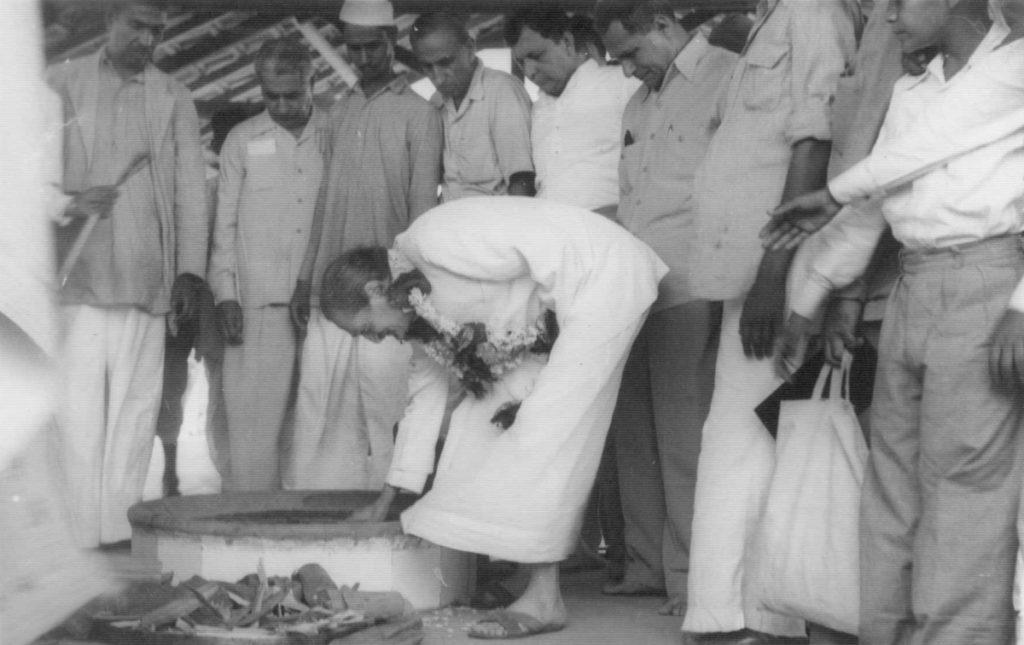
June 30, 2023
The Dhuni and Answered Prayer
What is answered prayer? Once, in Mandali Hall, Meher Baba’s close disciple Eruch told the story of a British dairy farmer named Michael who loved Baba.[i] In 1976, England was experiencing a terrible drought. As it wore on, Michael started going up to his second floor terrace each day to look at the bright unforgiving sky, hoping to see even the wisp of a cloud. He would then gaze at his sun-scorched plants and increasingly desperate cattle and become increasingly desperate himself.
In early November of 1925, Indian villagers in a similar plight made a long march through the countryside to see Meher Baba.[ii] They beseeched Him for rain; He told them to be patient. Soon after, on the night of November 10, with increased urgency, they came again. Baba asked that Upasni Maharaj’s Arti be sung. Then He had a pit dug for a sacred fire, a Dhuni. When the fire died down, Baba told the villagers, “God has heard your prayers. Now go straight home.” On their way home, drops of rain began brushing their faces. Their crops were saved.
In England, fifty years later, Michael lit two sticks of incense one day before making his daily trudging pilgrimage up the stairs to stare at the unforgiving blue of the sky. But something about the vision of the incense gave him pause: he remembered that story of the desperate farmers and their walk to Baba. He remembered their plea. As Eruch described it, Michael thought to himself, “He is the slave of His lovers, and I love Him, so He must listen to me!” And he asked Baba for rain.
The next day, under the blazing empty sky, Michael enlisted his wife and daughters to help him clear out the gutters of his house. The day after that, as his crops wilted in the bright sunshine, he went to the pub with his wife and all but one of his daughters. He was chatting with a neighbor when he was told a call had come in from the daughter back home. “Dad, please come soon, our house is flooding!” Their property, and only their property, was being drenched by torrents of rain. After it stopped, they spent days clearing out the water that had inundated their house; Eruch commented wryly that their carpets were ruined. The crops and the cattle were saved.
But is the power of the Dhuni fire about getting what we want? Or having it taken away? Despite the first dramatic rain-giving Dhuni, despite the saving inundation in the middle of a British drought, Baba said, “Don’t connect me with any miracles. Also never think that I will perform any miracles of the type of bringing the dead to life. But it will be Baba’s real miracle if I deprive you of everything and still you go on loving me … The human mind is full of infinite thoughts. This mind is finite, but its thoughts are infinite. So burn your desires and thoughts in the Dhuni today. At least let one thought of either lust, greed or anger be burnt in it.”[iii]
The first story of Baba and a Dhuni in Baba’s biography, Lord Meher, takes place in 1917.[iv] Baba’s beloved aunt, Pila Masi, was very sick. He went to her and gave her Dhuni ash from Upasni Maharaj’s Dhuni to drink in sugared water, saying, “Drink it and by tomorrow you will be well. You will be cured forever…” The next day, Pila Masi died, gathered up into His arms.
As Baba wrote in a poem about the Dhuni in 1925, “The seed you fructify, while the tree you uproot—Both are your blessings.”[v]
Eruch described hearing the story of Michael and his wife as they sat together in Mandali Hall. The couple was glowing with happiness—it was the joy on their faces that inspired him to ask how they had come to be there. And that was the end of their story about answered prayer. The rain that appeared above their little farm gave them more than just what they wanted, saving their crops and their withering cattle. It also allowed them to make the journey to India together, to be at Meherazad that day, talking with Eruch, glowing with joy. It ultimately did what perhaps the Dhuni fire is meant to do, what true prayer always does—it brought them to God.
[i] Details of Michael’s story from an audio recording of Eruch Jessawala, Mandali Hall Talks, number EF014-A[ii] Lord Meher, Online Edition, by Bhau Kalchuri, p. 622
[iii] Lord Meher, Online Edition, by Bhau Kalchuri, p. 3777
[iv] Lord Meher, Online Edition, by Bhau Kalchuri, p. 190
[v] Lord Meher, Online Edition, by Bhau Kalchuri, p. 624